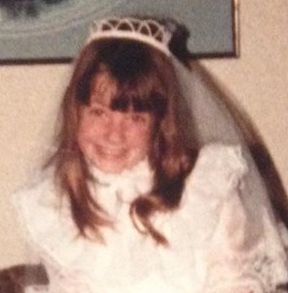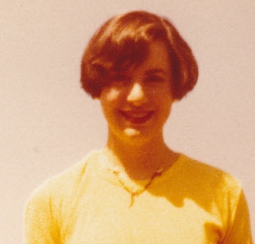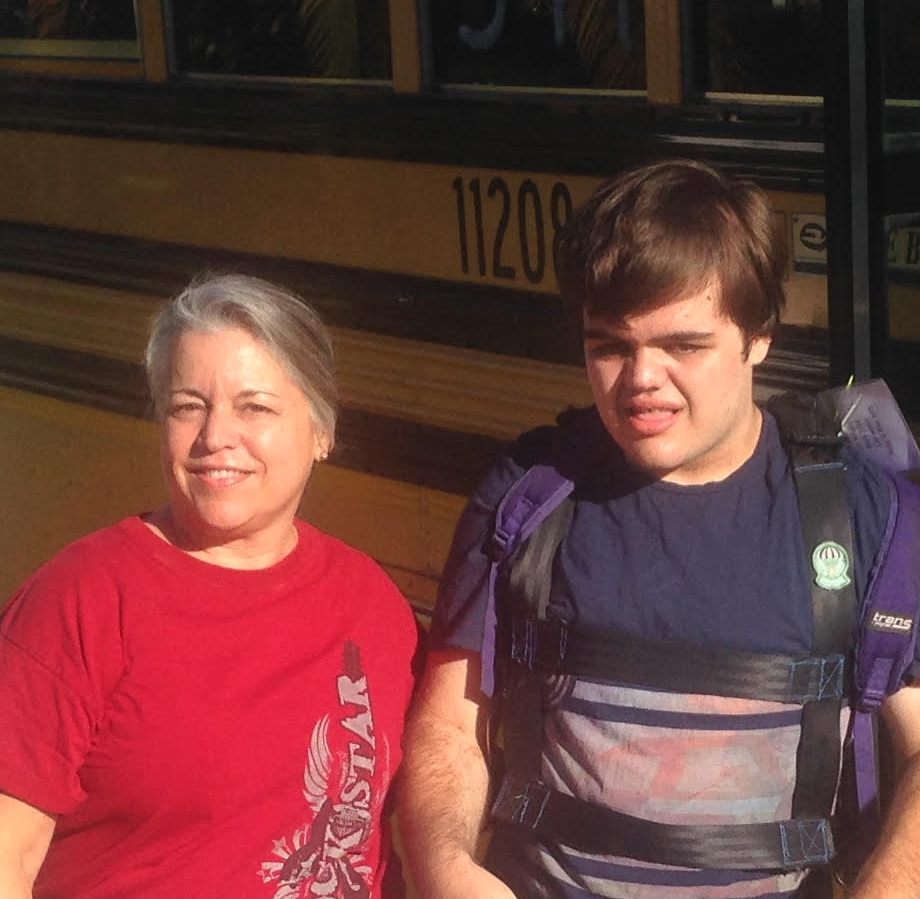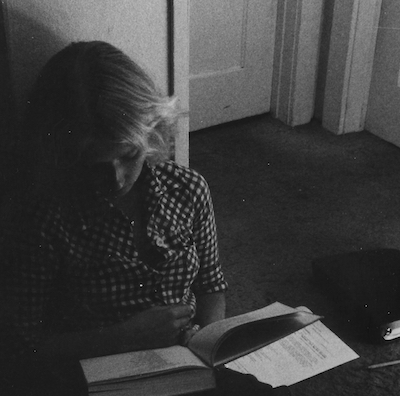It’s not about me; it’s not about me; it’s not about me, I kept telling myself as my boots clomped against the white linoleum in the basement of Lucile Packard Children’s Hospital. Round the corner, past the model train set stretched a long, lighted and mostly empty hallway. My skin sizzled as I launched myself into its wide, glowing mouth. Scanning the numbers on office doors as I passed, I searched for G83.
With my fingers mentally crossed, my heart thudded against my ribcage in competition with the beat of my boots on the hard floor. Certainly the pre-op room for children having their appendix out could not possibly be the same pre-op room for children having complex open-heart surgery.
I found the room with the correct number on the left. The door looked just like the one I remembered from 18 months earlier. There were all so nondescript; it was unclear if it was the same door or just an identical door. With my feet together and my fingers gripping my purse strap, I faced the door and held a stand-off with this inanimate object I was ready to kick if provoked. Staring at its blandness, the air conditioning flowing like a stream’s erratic current at my back through the early evening’s emptiness, I waited. Voices of fellow parents or employees heading home echoed. Do I just go in? Should I wait to hear back first?
After squeezing the minivan into an underground parking spot, I had texted to make sure they were still here. But I hadn’t heard. We had separated a couple of hours earlier so that I could go home to retrieve a change of clothes, a favorite blanket, and a stuffed toy for my stepdaughter who had been admitted for an appendectomy.
But why would I wait to go in? His last update said they were here. I pushed the door, and before stepping inside I could see it was an empty room. I could also see it was the same room as last time. Emotional vertigo took me back to the morning my son Riley was checking in for his sixth open-heart surgery. As I inched into the space, my eyes flashed through that long-ago morning--the kids sitting on the built-in sofa holding their stuffed animals, the spiral bound book of get-well-soon cards from classmates. A stack of consent papers on the table waiting to be signed. Then after a bit of horsing around, my boy saying goodbye to his siblings for what was supposed to be a day or two until he was stable enough for visitors.
After scanning through the memories, my eyes are pulled across the room to that other door, a one-way exit that launches children into operating rooms. There he had exchanged his pale red shirt and green shorts for a slightly too small hospital gown. There I had held him and kissed him and felt the sound of his sweet but scared 11-year-old voice reverberate in my ear for the last time. I listen hard to hear it now, but the soft whoosh of the a/c is the only sound. Chills course head to toe the way a shake cascades from head to tail on our dog.
But this is not then. It’s clearly not then. It’s just me, and I’m teetering between last time and this place now, where my husband and stepdaughter were supposed to be. They must have passed through a while ago; the staff has left for the day. It’s after hours, and the emergency nighttime lighting makes the room feel sleepy, surreal with possibilities. My eyes linger on the squishy booth seating and the round tables with small chairs tucked in around them. It was the same. Of course it was the same.
My body sinks into the green built-in sofa, the one my children sat on together the last time they were all alive. I have an urge to lie down and lick it. To taste for memories of my son. Salt from his skin. Toothpaste from his face. The minty soap from his hands from our house. As the minute hand swings around the clock face, the minutes wrap around my limbs, holding me in the stillness of now and the trepidation of then.
Maybe none of it has happened yet, I wonder, letting my heartbroken mind wander to a place of possibility. Maybe he hasn’t had surgery yet. Maybe I am earlier than everyone else. Maybe they are parking the car and the children haven’t come in yet. Maybe he hasn’t spent the next eleven days dying yet. Perhaps there is still a chance to stop it, to undo the horrors of his broken body surrendering to its unfixable wounds. Who could tell with the same sofa and the same round table and same desk with the same wall clock? I’m sure they’ll be in soon. I must have come in early to be sure the Ativan was dissolved into my bloodstream before I had to reassure him that everything was going to be okay, before I had to tell him that I’d see him soon, before my fingers intertwined with his, before his arms circled, then squeezed my body for the last time.
As I waited for my husband, I opened Facebook to coax my mind into the present, but instead it welcomed me with a picture I’d posted six years earlier when my boys’ bodies were much more compact. In the photo, they sat on the kitchen floor of the rental we lived in, with spatulas in their hands and brownie batter smeared on their faces, a near-empty silver bowl between them. I’d never shared one of those memories before, but being sucked into the past where my boys were alive colluded and collided with the idea that this was still before. I lingered on the photo, and love swelled in my chest before grief’s sledgehammer broke the memory’s sweetness and my lungs’ ability to inhale. A minute later, I typed: “My boys... Wishing life could have a rewind button,” then clicked the share button.
Eighteen months into grief, I still don’t understand why this happened, although I’m at least starting to understand that the why will likely be something I never know the answer to. I wait in the darkened room wishing for the power to change the outcome of his failed surgery. I linger in the possibility of having that magical rewind button to bring us all back together, having a way out of grief to a different life with all of my children healthy and alive. It was something I often wished for, just the great undoing of it all with the push of that button.
Eventually a text appeared from my husband with an update on his whereabouts and how they just finished talking to the surgeon and how they were waiting for them to take her into surgery. It pulled me back to the room that I was in, the one in 2016, not the one in 2014. I replied that he could find me in the cafeteria when he was done.
I stepped out of the dim office space and into the glowing hallway; my feet carried me to the cafeteria. It was another room in the hospital that toyed with memory. As I walked into the expanse, it became clear that a room is just a space with which time doesn’t communicate. A room doesn't know if my son is alive or dead. Only intellect knows if it’s before or after, then or now. My heart wants it to be then. Always then. Always before. Then and before still had hope.
Still bruised from that sledgehammer, I fell onto the cushioned bench and began digging in my bag for tissues. The pile of soggy ones grew around me, as they did wherever I went. They were grief’s breadcrumbs. To pass the time, I opened my laptop. There was a message from a mother I’d connected with when Riley was about four years old. It was after he’d been diagnosed with a disorder that led to his fourth and fifth open-heart surgeries. Her son had been diagnosed with the same disease. She’d found us because we’d been chronicling Riley’s journey on his blog, but her son died not long after we started communicating. Still, we had stayed connected online.
She’d seen the picture of my brownie-smeared boys and my words about wishing for that magical rewind button. “If you could go back in time but knew you couldn't change the outcome,” she wrote, “how many times do you think your heart could handle it?”
After I muffled my sobs, I opened the conversation in Facebook so that I could reply. Her question really caught me... At first, it made me cry because the implications of what I was saying hadn't really occurred to me. The photo appeared, and I had a longing to go back to that more innocent time, even though it was a time in which I lived with low level panic, always worried about when Riley would need another surgery to get more oxygen around his body with half a heart. But as I thought about her question, I realized it wasn’t as simple as just going back. Going back meant doing it again.
“At first I could do it over and over because I would get to go back to that time when we were all alive and happy,” I typed. “But then I realized I would have to endure this agony of losing him again. But as horrible as it is, I would get to be with him again and therefore it would be good.”
It had been 18 months since he died, and somehow I was living my life. I got up every morning and went to bed every night. The crippling grief was a price I’d pay again and again to spend time with my garlic- and Tabasco-loving son. An image of him opening his Tabasco caddy with all seven kinds of hot sauce on his eleventh birthday flashed into my consciousness. More of him, his voice, his expansive blue eyes, the weight of his body on my lap. Yes, I would suffer for him again and again.
As I felt sturdy in my words to this mother, it occurred to me that my perspective was almost irrelevant because really it was Riley who had to endure all of it. As his mother, I was only a witness, a bystander to what was being done to his body. The idea of it happening to him again and again as I selfishly pressed the rewind button was unbearable.
Needing more air, my eyes scanned the ceiling for the circulation vents. I went and filled a cup with ice water and considered pouring it down my shirt before gulping it. With frigid water in my gut, I felt slightly cooled, and my fingers returned to the keyboard. Mid-sentence I paused because I sensed my husband’s tall frame approach the table. With my fingers poised above the laptop, my eyes took in his curly locks, his worried face. As I shifted to make room for him, his weight landed to my right, his arms wrapping around my shaken body. His touch allowed me to stop holding back, and I heaved into his side. When I started to settle, he said, “She’s in surgery now. We’ve got about 30 minutes.”
My head pressed into his shoulder, and his shirt fabric darkened as my tears soaked in. “How messed up is this?” I asked. “Your daughter is having surgery, and you’re comforting me.”
Like spotlights, the overhead bulbs made me feel exposed and shameful in that public space. Somehow I managed to make my stepdaughter’s surgery about me, about my son, about my grief. But how could I possibly separate the two? The same hospital, the same pre-op room, the same sofas and tables and large jars filled with cucumber and mint flavored ice water, the same vending machines and filtered air. The visitor sticker on my chest even had the same photo. The only difference was the expiration date on milk jugs, the length of my hair, and the flowers that now bloomed in the front yard.
“It’s okay. It doesn’t matter,” he said, pulling me in tighter, his arms flexing their ability to settle the chaos in my brain.
Someone pushed open the door to the courtyard at the end of the cafeteria, letting the cool April air refresh my overheated skin. I wanted to drink it, to let it wash away the heat rising from my sad body. I wished we were sitting at the table in the dark outside, invisible, smaller, hidden from this building, from its ability to replay the scenes from Riley’s last hospitalization that unfolded just a few floors above us.
The minutes in my safe place made space for my mind to try and make sense of the implications of what I suggested in my seemingly-innocent Facebook post. It was my boys eating brownies. They were little, and we were together. It was such a wonderful time, even with all of that uncertainty around Riley’s health. My ex and I had split, I finally had a home with my boys, I was in grad school, and I had just started dating my new husband. I felt like life had possibilities. Even though I knew deep down that Riley would need more surgeries, he'd been relatively healthy for a few years; I didn't really believe that something could happen to him. I would almost call that period of time happy. I pulled away from my husband’s embrace to respond to my friend again.
“If I could hit rewind and all of this would be erased, I wouldn't know that he was going to die. I wouldn’t know grief. I'd be ignorant and happy for the next four and half years after that photo was taken. But if I had to hit rewind knowing all of this was in store for him all over again, I don't know…” I paused to let the thoughts gel.
As the cacophony in my mind began to harmonize, the sobbing escalated. I felt the eyes of strangers looking at us. Nothing felt stable. All I’ve wanted was to go back in time, to bring him back, to have more days where we made brownies and played catch and read books at bedtime. I wanted to have him sit on my lap and ask for caprese sandwiches. I wanted to let him make garlic croutons out of bits of dry bread. The world blurred as my head shook back at forth at my selfish, selfish wishes.
“I would never put him through that again,” I finally typed. And after a long pause “...which means I could never press the button.”
She responded right away. “What you said makes perfect sense,” she wrote. “That's the ultimate sacrificial love. What an incredibly sucky way to learn about love.”
I closed my laptop. It was time to go to the waiting room. My stepdaughter’s surgeon would be looking for us soon.
Welcome to the sixth issue of Six Hens.






